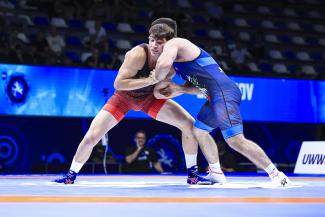FS World Cup: All you need to know
Wednesday, November 30, 2022 - 12:44 By Vinay Siwach

CORALVILLE, Iowa (November 30) -- The World Cup is back in the United States. After three years of absence, the freestyle World Cup will be held December 10 and 11 at the Xtreme Arena in Coralville, Iowa. To make it special, the women's World Cup will also be held simultaneously.
The USA and Iran, the two best teams from the World Championships, are expected to meet in the final as both are placed in different groups. But it will be unwise to count out the All-World Team, a team comprising the best wrestlers in each weight class from Belgrade after the five qualified teams.
Iran finished second to the USA in the team race in Belgrade but it will be eyeing another World Cup win. The USA will have added pressure, wrestling in front of the home crowd.
 Jordan BURROUGHS (USA) led the US to the World Cup win in 2018. (Photo: UWW / Tony Rotundo)
Jordan BURROUGHS (USA) led the US to the World Cup win in 2018. (Photo: UWW / Tony Rotundo)
Led by six-time world champion Jordan BURROUGHS (USA) and Kyle SNYDER (USA), the home team would like to repeat the title win from 2018. The two will be joined by a young team with little international experience. World silver medalist John DIAKOMIHALIS (USA), Seth GROSS (USA), Jason NOLF (USA), Zahid VALENCIA (USA) and Hayden ZILLMER (USA) are also part of the squad.
In Group A, the USA will open the World Cup against Mongolia which surprised all by qualifying for the tournament in the fifth spot. As far as the match-ups go, the USA holds the upper hand against Mongolia which is bringing all three of its Belgrade World medalists. But given the depth in the US squad, it will be an uphill ask for Mongolia to go past the hosts.
The US vs Mongolia match will be followed by Iran taking on Japan in the morning session on December 10. With the Emperor's Cup scheduled 10 days after the World Cup, a few of Japan's stars, including both world champions, are giving the tournament in the US a miss.
U23 world champion Tatsuya SHIRAI (JPN) will spearhead the young team which includes Taichi YAMAGUCHI (JPN) and U23 world bronze medalist Ryoma ANRAKU (JPN) among others who are short on international experience.
 Two-time world champion Kamran GHASEMPOUR (IRI) will lead the Iran team. (Photo: UWW / Kadir Caliskan)
Two-time world champion Kamran GHASEMPOUR (IRI) will lead the Iran team. (Photo: UWW / Kadir Caliskan)
Iran should not have a difficult time handling the team and a win against Japan will take them a step closer to the final.
The second session on Saturday will see Georgia take on Mongolia with the former looking strong on paper. But it may come down to the wire as both do have a young squad. Georgia is bringing a pair of U23 world champions in Giorgi ELBAKIDZE (GEO) and Vladimeri GAMKRELIDZE (GEO) along with senior world medalists in Miriani MAISURADZE (GEO) and Beka LOMTADZE (GEO) with Beka BUJIASHVILI (GEO), Teimuraz VANISHVILI (GEO), Giorgi SULAVA (GEO), Tarzan MAISURADZE (GEO), Givi MATCHARASHVILI (GEO) and Solomon MANASHVILI (GEO) completing the line-up.
The match-up will be a key factor in deciding which team manages to reach the dual for third place if both teams lose to the US.

The All-World Team will make its debut soon after this match against Japan. World champion Zelimkhan ABAKAROV (UWW) will be opening the competition for them and in all likelihood, it should cleansweep the dual against Japan and set up a thrilling final group dual against Iran.
It also compromises of two-time world medalist Iszmail MUSZUKAJEV (UWW), the bronze medalist from Belgrade Ernazar AKMATALIEV (UWW), two silver medalists from Belgrade in Tajmuraz SALKAZANOV (UWW) at 74kg and Batyrbek TSAKULOV (UWW) at 97kg. Osman NURMAGOMEDOV (UWW) at 92kg, Azamat DAULETBEKOV (UWW) at 86kg, Arslan BUDAZHAPOV (UWW) at 79kg, Georgi VANGELOV (UWW) at 61kg and Oleksandr KHOTSIANIVSKYI (UKR) at 125kg will also be taking the mat.
It will all come down to session three on Saturday as Georgia clashes with the US and Iran takes on the All-World Team.
The US will be the favorite against Georgia but the match-ups between Bujiasvili and Richards at 57kg, Elbakidze and Berger at 70kg, Maisuradze and Valencia at 86kg, Maisuradze and Jackson at 92kg, Manashvili and Zillmer at 125kg can tilt the dual in favor of Georgia.
The same is the case for Iran vs All-World. Abakarov will be a heavy favorite at 57kg against Reza MOMENIJOUJADEH (IRI) while Vangelov will have to go past Armin HABIBZADEH (IRI) at 61kg. A rematch from Belgrade between world champion Rahman AMOUZAD (IRI) and Muszukajev at 65kg will be a match for every wrestling fan. Another fan-favorite bout is at 70kg between Akmataliev and Amirmohammad YAZDANI (IRI) and it can go either way and prove crucial in the end result.
U23 world champion Mohmmadsadegh FIROUZPOUR (IRI) will have to punch above his weight to beat Salkazanov at 74kg while Karimi will hope to continue his winning record against Dauletbekov. At 92kg, Nurmagomedov will face two-time world champion Kamran GHASEMPOUR (IRI) in a tough bout before Tsakulov gets U23 world champion Amirali AZARPIRA (IRI).
At 125kg, U23 world champion Amirreza MASOUMI (IRI) will fancy his chances against Khotsianivskyi but no team can be sure of a victory and a spot in the final.
The winner of this match is likely to reach the final with the US waiting. The finalists can be different if Georgia punches above its weight to upset the US.
Iran vs USA or All-World Team vs US, both matches promise to be a close battle and will give the fans their worth in the two-day tournament.


Share your thoughts.
Comments